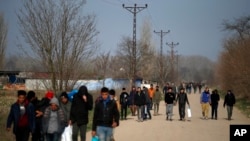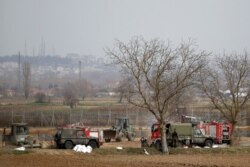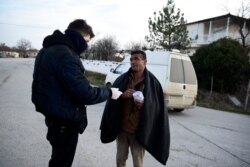For the past five months, Ahmed Ibrahim has been living on the Greek island of Samos in a makeshift refugee camp waiting for his papers to be processed by Greek authorities.
Ibrahim, a 23-year-old Syrian Palestinian refugee from the Damascus countryside, has been living in limbo since 2017 when he crossed Turkey into Greece seeking a better future. His fate, among thousands, is now tied to deals yet to be reached between the European Union and Turkey.
"I wasn't able to issue a residency card in Turkey, and recently the Turkish authorities have been tightening measures against refugees who don't have a Kimlik (Turkish Temporary Protection card)," Ibrahim told VOA. "Security was rounding up illegal refugees and sending them back to Syria. I tried seven times to reach Greece, and succeeded in the eighth."
Ibrahim was born in Syria but was never granted Syrian citizenship, due to the country's policy regarding Palestinian refugees, allegedly to protect their Palestinian identity. His family arrived in Syria after the 1948 conflict with Israel. As refugees, they had to live in different places until their final settlement in the Hussainya area near the capital, Damascus.
Growing up as a refugee, Ibrahim said he always dreamed of a life in which he could peacefully pursue his education. That dream was shattered in early 2011, when the Syrian civil war erupted.
Ibrahim was lucky to have survived the Syrian government's bombardment of his neighborhood in the Damascus countryside when the conflict escalated between 2013 and 2014. His decision to flee to Turkey, and then to Europe via the Greek island of Samos, came later when he was ordered to serve in the Syrian army in its ongoing war against the opposition.
Increasing numbers of refugees
Considered by refugees as a gate to Europe, Samos is two kilometers off the coast of Turkey. The United Nations High Commission for Refugees (UNHCR) estimated that more than 7,000 refugees live in dangerous, overcrowded conditions in the island's refugee camp.
"Once you get here, you are on your own. Men, women and children — when they arrive here, they sleep in the open air for few days before an NGO helps them with a tent and food," Ibrahim said. "I slept under a tree for several days before I got my own tent."
Ibrahim added that the refugee situation has become more dire, due to a new influx of migrants after the conflict in Idlib escalated in December.
On Feb. 28, Ankara announced it will open its borders with Europe and allow refugees to cross. The decision came after Syrian government forces, aided by Russia, began advancing against Turkey-backed rebels. The new offensive has reportedly displaced over 1 million people mostly to a strip close to the Turkish border.
The Turkish announcement has put EU leaders on alert, fearing a new crisis similar to the one in 2015 when almost 1 million refugees landed on Europe's shores.
EU-Turkey agreement
In 2016, Turkey and the EU signed an agreement to prevent further refugee crossings via the Mediterranean Sea and Turkish land borders. In return, Europe agreed to provide funds to Ankara to handle refugees on its lands, among other issues.
That agreement seemed to hold until last month, when Turkish authorities reportedly opened their borders, allowing hundreds of families to head to Greece.
Sources from the Turkey-Greece border told VOA that thousands of refugees were staying in the wild in cold weather behind the heavily guarded Greek border. Since then, at least one elderly man reportedly froze to death, and another young man was fatally shot by Greek border guards.
"If European countries want to resolve the issue, they must support Turkey's efforts for political and humanitarian solutions in Syria," Turkish President Recep Tayyip Erdogan said in a televised speech last week. He said his country's economy was not able to support the refugees, while the conflict in Idlib could bring in thousands more Syrians.
The United Nations estimates that Turkey is currently hosting 4.1 million refugees, most of them — about 3.7 million — are Syrian.
Erdogan's statements triggered a response from EU leaders, who accused him of turning a humanitarian situation to a pressure card for political gain. The leaders have pledged financial assistance to help Greece respond to the situation.
Vigilante violence
The unfolding crisis has triggered criticism from human rights groups who say the innocent civilians displaced by war should be sheltered. They say the refugees on the Turkey-Greece border, particularly children, remain vulnerable to harsh winter conditions and violence from border guards.
Eva Cosse, a researcher at Human Rights Watch with a focus on Greece, said her organization in the past two weeks has observed a "worrying increase" of violence by Greek police toward the refugees.
"The Greek government is saying that they are revising the possibility for people to apply for asylum. And having the leaders of the EU supporting Greece in what the government is doing is like giving a green light to commit abuses," Cosse told VOA.
Cosse added that the organization has also seen anti-refugee violence on the rise without criticism from EU and Greek politicians. She said locals have been attacking refugees, preventing boats from reaching shores and burning refugees' tents, among other acts. Humanitarian workers and journalists have also been targeted.
"We really hope that this time, Greece and the EU have learned from the past mistakes and from the way they dealt with the crisis in 2015. We hope that this time, they would show more solidarity and humanity. We believe that this the answer," Cosse said.






